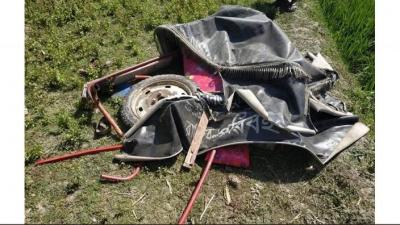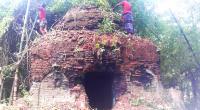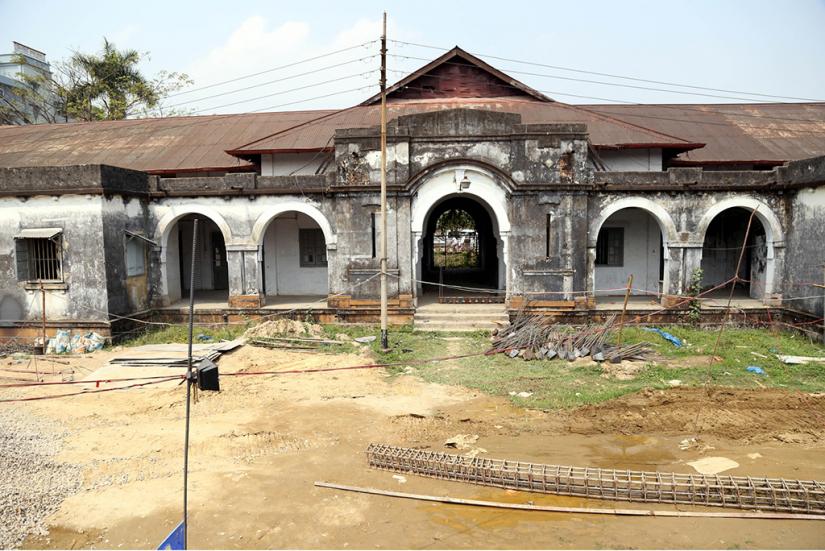 Abu Sina Hostel, a more than 150-year-old dormitory for Sylhet Medical College students, is being demolished to make room for a skyscraper.
Abu Sina Hostel, a more than 150-year-old dormitory for Sylhet Medical College students, is being demolished to make room for a skyscraper.
Part of the historic building has already been demolished for ongoing piling work of the multi-storey building, a 250-bed district hospital.
Locals have urged authorities concerned to halt construction of the new hospital in this location to save the historic hostel, which features ancient Assamese architecture.
Abu Sina Hostel, located near Sahid Shamsuddin Ahmed Hospital, has been abandoned for quite some time. Students no longer use the building as a dormitory. However, demolition of this building has caused distress among locals, who want this historic structure preserved for future generations.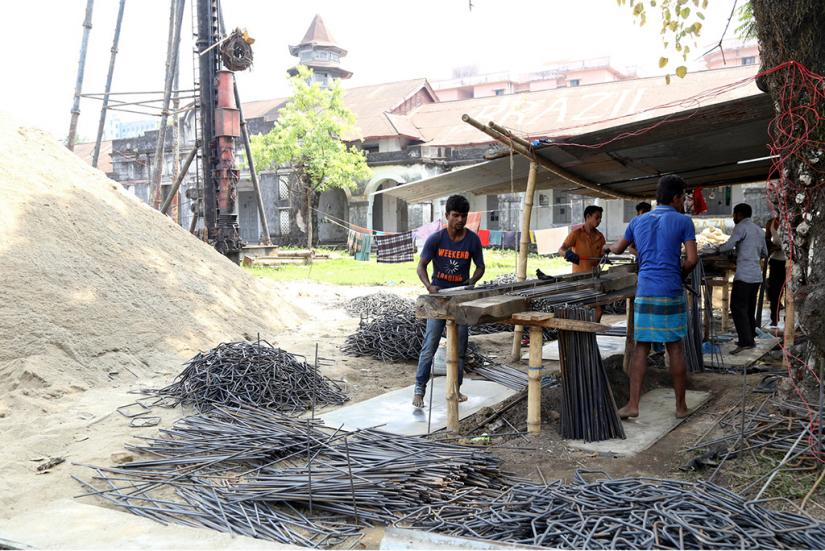 A piece of nostalgia
A piece of nostalgia
The building showcasing Assamese architecture was constructed around the year 1870. The Sylhet Civil Hospital started its journey in this building back in 1936. The hospital was shifted to another area in 1948, and the building was transformed into the Sylhet Medical School.
In 1962, the medical school was turned into a college.
The Sylhet Medical College was shifted to the city’s Kajalshah area in 1971-72. The building was then turned into a students’ dormitory and renamed Abu Sina Hostel.
The nearby Sahid Shamsuddin Ahmed Hospital is in the process of being turned into a children’s hospital, and the historic dormitory has been abandoned for quite some time. The Abu Sina Hostel is scheduled to be demolished soon, and a district hospital will be built in its place.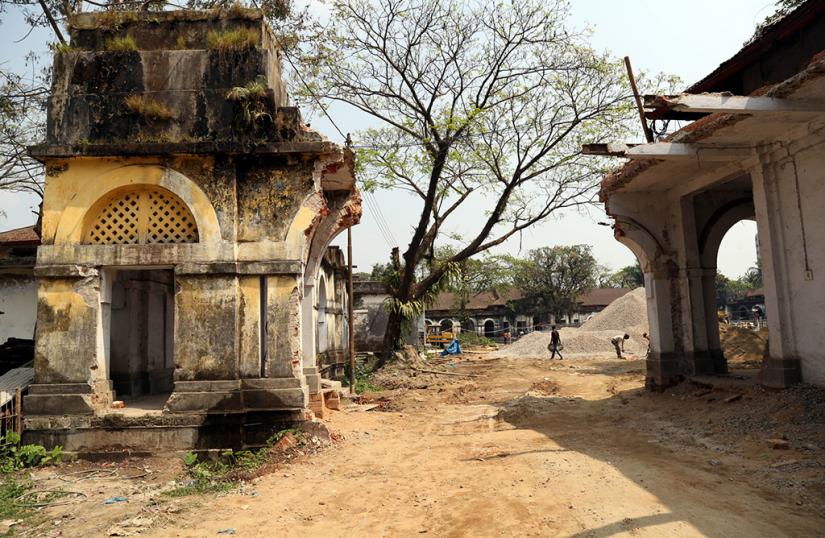 Dismantling history
Dismantling history
According to sources, a 15-storey public hospital featuring 250 beds is being built there under the supervision of the Public Works Department (PWD).
Responding to queries, PWD Executive Engineer Qutub AL Hossain said: “Abu Sina Hostel is not enlisted with the Archeology Department, so there is no legal barrier against demolishing the structure.”
“The building is presently in a derelict condition and it is posing a threat to public safety. Considering these facts, authorities made the decision to build a 250-bed district hospital in place of the hostel.”
Presenting a different point of view, Regional Director of the Archeology Department Ataur Rahman said: “Despite not being enlisted with the Archeology Department, any structure can be an archaeologically important structure.”
“The department must be notified before demolishing any structure older than a hundred years, so that it can conduct a study to evaluate the historical significance of a building,” he stated.
Ataur pointed out that neither the Health Department not the PWD had informed the Archeology Department before moving forward with the demolition of Abu Sina Hostel.
Demo for saving the hostel
On Tuesday, heritage and environmental protection organizations announced a two-day program to protect the hostel from demolition.
As part of the demonstration, a human chain was held at the Sylhet Central Shaheed Minar premises. A rally and a public awareness campaign, showcasing the historical importance of the building, were also organized.
Speaking at the event, speakers recommended that the historic hostel be renovated and turned into a museum, and the under-construction district hospital be shifted to another area in the city.
Protesters then visited the Abu Sina Hostel and hung up a banner calling for an end to its demolition.
General Secretary of Bangladesh Poribesh Andolon (BAPA) Abdul Karim Chowdhury Kim and the Sylhet unit president of Citizens for Good Governance (Shujan) Faruk Mahmud Chowdhury were present at the event, among many others.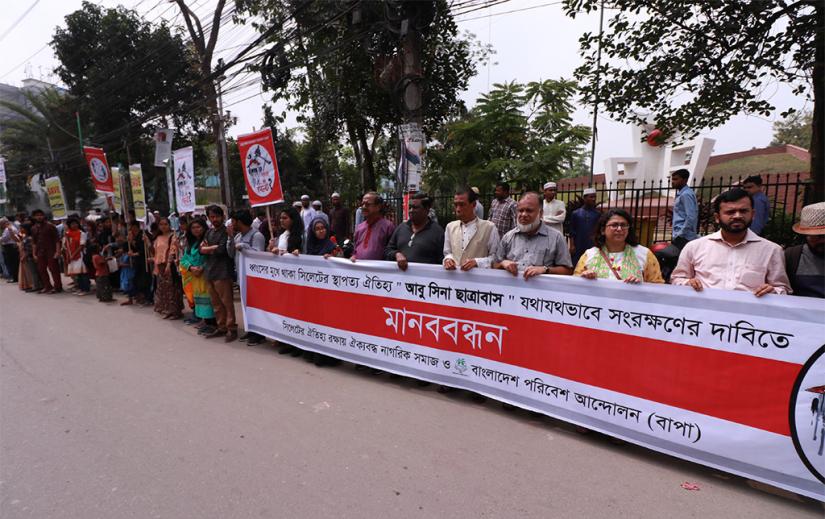 A contractor firm named GKBPL-PEL (JB) is working on the project. Under the initial phase, construction of eight floors is underway, with an estimated cost of Tk87 crore.
A contractor firm named GKBPL-PEL (JB) is working on the project. Under the initial phase, construction of eight floors is underway, with an estimated cost of Tk87 crore.
Prime Minister Sheikh Hasina laid the foundation stone for the project in January last year, and the contractor firm received work in July the same year. The construction is scheduled to conclude within 48 months.
Visiting the historic building on Tuesday, It was found that the building is in a derelict condition. It is being used as a construction material warehouse by the contractors, and doors and windows are missing.
Part of the building has been demolished for a road, built for ease of access into the construction site. The laborers prevented any attempt to photograph the site, citing regulations.
Public outcry
Many locals and experts supporting the preservation of history have raised public outcry against the demolition of Abu Sina Hostel.
Addressing the issue, Sylhet General Secretary of Bangladesh Poribesh Andolon (BAPA), Abdul Karim Chowdhury Kim said: “The hostel is the oldest standing building in Sylhet, and it is historically significant.”
“The first newspaper in Sylhet, Sri Hatta Prokash, started its journey from this building in 1876. The structure survived the major earthquake of 1897, the end of British rule and the Liberation War of Bangladesh,” he said.
He added that it is imperative that this hostel be protected from demolition.
Sylhet Coordinator of Bangladesh Environmental Lawyers Association (BELA), Advocate Shah Shaheda Akter said: “The country’s history must be preserved. A new building can be built, after preserving the ancient one.”
“The historical dormitory can be turned into a museum,” he suggested.
‘No legal barrier’
The Antiquities Act, 1968 (Amended in 1976), states that any building older than one hundred years can be enlisted as an important archeological structure.
However, as the Abu Sina Hostel is not enlisted as an archaeologically important structure, the PWD has moved forward with the demolition of the building.
 Country
Country
30895 hour(s) 6 minute(s) ago ;
Morning 02:00 ; Friday ; Apr 26, 2024
Sylhet historic building being demolished for hospital
Send
Mohammed Serajul Islam, Sylhet
Published : 18:23, Mar 14, 2019 | Updated : 18:28, Mar 14, 2019
Published : 18:23, Mar 14, 2019 | Updated : 18:28, Mar 14, 2019
0 ...0 ...
/hb/
Topics: Top Stories
- KOICA donates medical supplies to BSMMU
- 5 more flights to take back British nationals to London
- Covid19: Rajarbagh, Mohammadpur worst affected
- Momen joins UN solidarity song over COVID-19 combat
- Covid-19: OIC to hold special meeting
- WFP begins food distribution in Cox’s Bazar
- WFP begins food distribution in Cox’s Bazar
- 290 return home to Australia
- Third charter flight for US citizens to return home
- Dhaka proposes to postpone D8 Summit
Unauthorized use of news, image, information, etc published by Bangla Tribune is punishable by copyright law. Appropriate legal steps will be taken by the management against any person or body that infringes those laws.
Bangla Tribune is one of the most revered online newspapers in Bangladesh, due to its reputation of neutral coverage and incisive analysis.
F R Tower, 8/C Panthapath, Shukrabad, Dhaka-1207 | Phone: 58151324; 58151326, Fax: 58151329 | Mob: 01730794527, 01730794528




